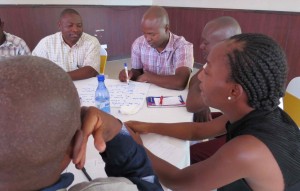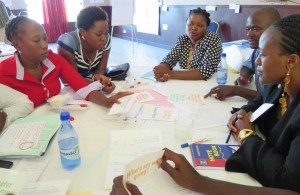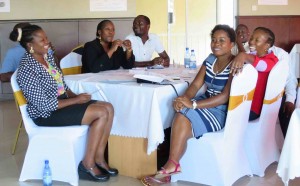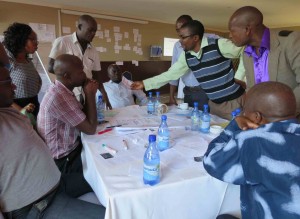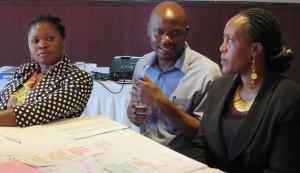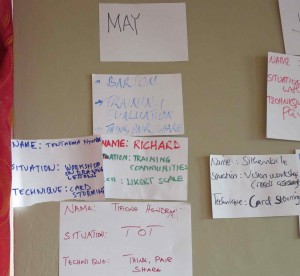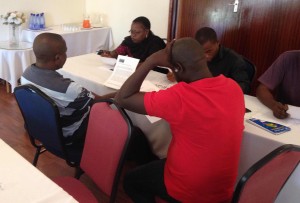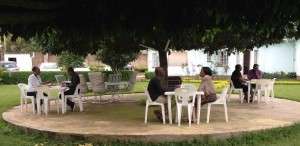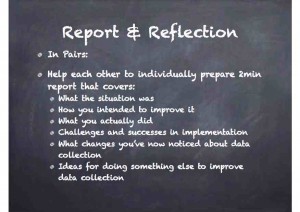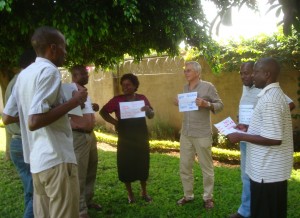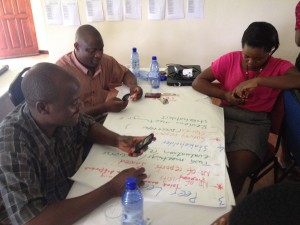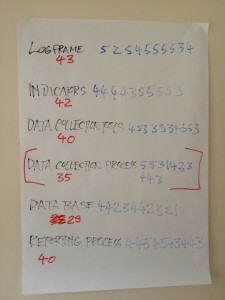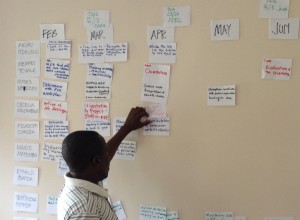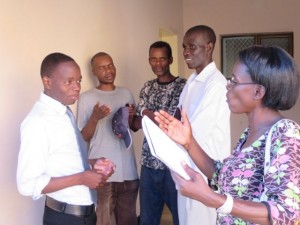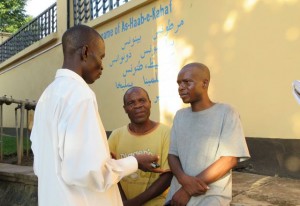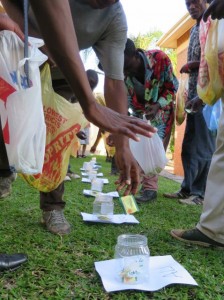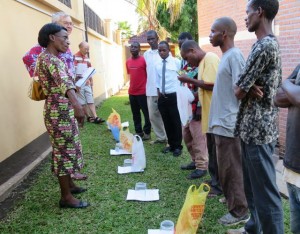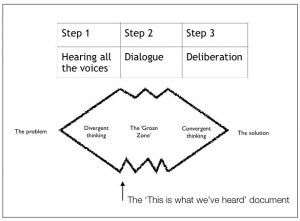 With our Government’s policy to ‘put the community at the centre of everything we do’, I have had plenty of opportunity to assist DELWP project managers design a participatory approach
With our Government’s policy to ‘put the community at the centre of everything we do’, I have had plenty of opportunity to assist DELWP project managers design a participatory approach 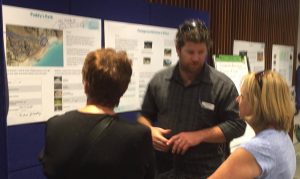 to their work. Based on the ‘diverge/converge’ model, the first part ‘hearing all the voices’ is critical to any sustainable resolution to a decision.
to their work. Based on the ‘diverge/converge’ model, the first part ‘hearing all the voices’ is critical to any sustainable resolution to a decision.
After the fire at Wye River I helped the local DELWP PM’s of five small projects identify their stakeholders and run ‘listening posts’ at the periphery of the official Town Hall style recovery meetings. These were sufficiently successful that the local staff were willing to analyse their stakeholders and ask for input to the ‘negotiables’ on a number of others.
Together with Semi-structured interviews and Kitchen Table Conversations, a really useful technique to outline the problem and start conversations has been the Open House technique. We have now run such events for the following projects, mainly around coastal issues:
- Coastal change Narrawong
- Coastal change Indented Head
- Coastal change Point Lonsdale
- Coastal change Apollo Bay
- Belfast Coastal Management Plan
- Winchelsea Common
- DELWP depot relocation Forrest
Coastal Change
Prior to going to Malawi, I was involved in Coastal Hazard Mapping projects, which included the release of the document for Port Fairy. The driver for action in Port Fairy was the exposure of an old land fill site in the dunes, and this eventually resulted in an engagement process driven by community members. What I have learned over the last 18 months is that when it comes to climate change and the coast, each locality is absolutely unique and requires a different approach in each instance.
Narrawong
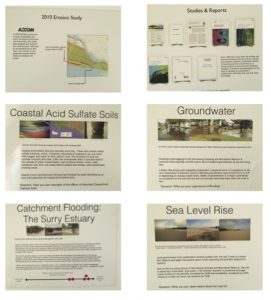
The need for engagement was driven by issues regarding a submerging campsite and local concerns about the committee which managed the camp site. See youtube video at:
https://www.coastsandmarine.vic.gov.au/coastal-programs/narrawong
As in all instances, posters developed were particular to the site and situation :
(A small aside; we had to ask the committee member who sat at the event the whole time to move his car when we realised others were turning away when seeing it in the car park)
Indented Head
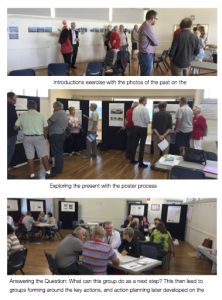 This was driven by City of Greater Geelong and through a series of small community meetings resulted in them inviting friends, neighbours etc. to a 1.5hr workshop that explored the ‘past present and future’ of this part of the coast. The past was a focussed conversation around photos provided by community members, for the present I used my poster process, and the future was a Noisy Round Robin followed by an Action Planning Session. A bit of a highlight for the group was members of the Port Fairy Citizens Science group being there. I included a poster illustrating their work.
This was driven by City of Greater Geelong and through a series of small community meetings resulted in them inviting friends, neighbours etc. to a 1.5hr workshop that explored the ‘past present and future’ of this part of the coast. The past was a focussed conversation around photos provided by community members, for the present I used my poster process, and the future was a Noisy Round Robin followed by an Action Planning Session. A bit of a highlight for the group was members of the Port Fairy Citizens Science group being there. I included a poster illustrating their work.Point Lonsdale
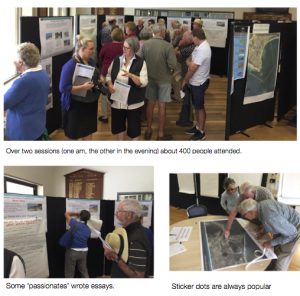 This process was developed in response to some community members concerned about sand missing from a section of beach.
This process was developed in response to some community members concerned about sand missing from a section of beach.The DELWP project managers engaged a consultant to do a desk top review of all the studies carried out on that piece of coast. At the completion of this work, we held an Open House to set the context of his report. Whilst the consultant was in attendance, we did not advertise it.
We have now completed the feedback sheet based on a ‘theme and name’ process, which is rapidly becoming a model for providing the feedback to all these events. Of particular mention is that there is no numbers attached to any idea (This is not a decision making sessio). We are now preparing for some World Cafe events using themes derived from the ‘what we heard’ groups. My current thought is to offer as many 1 hr workshops as desired, but limit the numbers to 24 per workshop. Still open to other ideas on that one! We’re also now offering horizontal surfaces for people to write on post-its. I’m still a bit cautious of that one. Maybe it should be both.
Apollo Bay
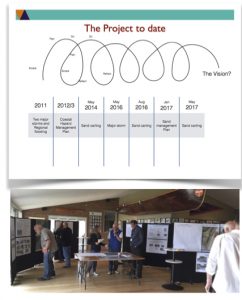 Storms in 2011 and 2016 had lead to specific and substantial spot erosion. Sand was replaced, but not without community dissent. In March this year money was allocated for a three year program to move sand. Because of the need to advertise and let a tender prior to winter there was little opportunity for ‘negotiables’, but still a need to inform the community that work would happen this year. Carried out in collaboration with the CoM, the Open House event was designed to be ‘inform’ for this year, but ‘consult’ on where to move sand from and too in subsequent years. Lots of ideas were expressed on how to retain the sand in the future.
Storms in 2011 and 2016 had lead to specific and substantial spot erosion. Sand was replaced, but not without community dissent. In March this year money was allocated for a three year program to move sand. Because of the need to advertise and let a tender prior to winter there was little opportunity for ‘negotiables’, but still a need to inform the community that work would happen this year. Carried out in collaboration with the CoM, the Open House event was designed to be ‘inform’ for this year, but ‘consult’ on where to move sand from and too in subsequent years. Lots of ideas were expressed on how to retain the sand in the future.
Winchelsea Common
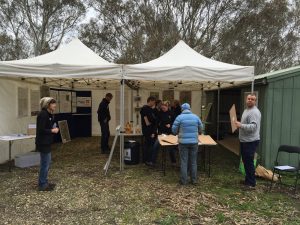 The Winchelsea Common had been closed by the EPA in 2013 due to the high levels of lead in the ground. The EPA required the local Council and DELWP for an engagement process to determine future use of the common to inform clean up notices. The ‘Open Shed’ was only an annex to the main engagement process which were ‘Reverse Guided Tours’ held throughout the day.
The Winchelsea Common had been closed by the EPA in 2013 due to the high levels of lead in the ground. The EPA required the local Council and DELWP for an engagement process to determine future use of the common to inform clean up notices. The ‘Open Shed’ was only an annex to the main engagement process which were ‘Reverse Guided Tours’ held throughout the day.Visitors to the Open Shed were invited to take part in facilitated site tours of The Common. The ‘reverse site tour’ was structured so that after a brief overview from agency representatives, the participants were provided the opportunity to comment at each of the four stops rather than listening to agency views.
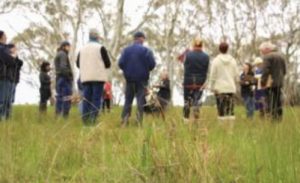
- Site 1. Two large trees showing lead shot damage
- Site 2 – Go-Kart Track
- Site 3 – Vegetated area with significant grasslands
- Site 4 – Open area with dirt mound/soil stockpile
At each site the community participants were asked:
- What do you like about this spot?
- What are the opportunities?
Each tour took approx. 45 -60 minutes. Feedback was captured by the tour facilitators.
By listening, the process helped ameliorate the anger of a group that saw the common closure as an act of class warfare.
Subsequent workshops with a landscape designer has resulted in a future use plan that all are willing to support.
Forrest depot relocation
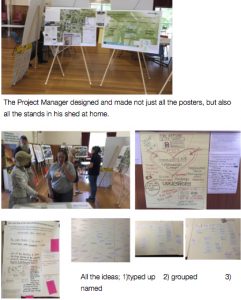 The DELWP Forrest Depot is being shut down, and a new facility being constructed in a village 10km away. Government policy is to allow community groups identify alternative uses prior to redundant facilities being sold on the open market. This Open House was designed to collect all the ideas for the reuse of this asset.
The DELWP Forrest Depot is being shut down, and a new facility being constructed in a village 10km away. Government policy is to allow community groups identify alternative uses prior to redundant facilities being sold on the open market. This Open House was designed to collect all the ideas for the reuse of this asset.
Belfast Coastal Management Plan
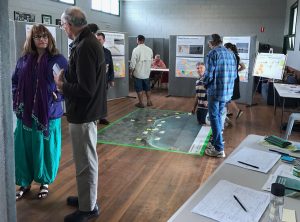 The beginnings of a complex project being carried out in collaboration with two local authorities and Parks Vic. This recently held Open House is just the start of an intensive six week period of listening to many diverse individuals and groups that have equally as many diverse opinions on how this substantial piece of coastline should be managed in the future.
The beginnings of a complex project being carried out in collaboration with two local authorities and Parks Vic. This recently held Open House is just the start of an intensive six week period of listening to many diverse individuals and groups that have equally as many diverse opinions on how this substantial piece of coastline should be managed in the future.
Reflections and Learnings
Every instance is completely unique. There is a driver for change, and a whole number of people are either interested or will be effected by a decision. The response has to be tailored for the specific situation. Some things that have worked:
Work with the local group (CoM, residents action group, etc.) to decide on place and time. They will also be the ones that do the best word of mouth advertising.
Don’t rely on media advertising. Put time into word of mouth personal connections.
Always put some form of advertising out, to ensure it is not seen to be restricted to those in the know.
Keep the posters as factual as possible, minimising Govt. staff opinions and ideas. Always look for the opportunity to get local opinions, ideas and views as part of the sessions. Develop ‘Negotiables’ and ‘Not Negotiables’ to inform key questions and key messages. Beware of assumptions!
Be careful of specialists and experts. Don’t advertise that they will be there, and if essential, make sure they are not in a large space.
Make sure the advertising is for a ‘drop in’ event, open between xx & yy hours. Try to have more than one session.
Good to have an accompanying website. Just make sure it corresponds in content and time with the ‘Hearing all the Voices’ section of the process.
Create a plan for the event. Know which posters are going where, how many boards, where they will be placed in the space, tables will go etc.
Kids space is good
Finding photos and asking community members for photos of the locality over time is excellent. Many find that their memories are a bit off.
Having a flip chart at the exit, and very pro-actively gathering ‘last thoughts’ as people leave. This often gives the best insights.
Both the event itself, and the ‘What we have heard’ document allow participants to see the wide range of views on the topic.
Things that need more work.
I don’t feel I’ve worked out the writing horizontally/vertically business. I think it is easier for people to read work posted vertically, but probably write horizontally. I think facilitators should write what others are saying vertically. So it needs a bit of both.
Sometimes PM’s finding the time for word of mouth engagement/advertising
Staff are getting better at listening and scribing. The 15min training helps. I think we could get better at using the internal facilitators group in Head Office.
My biggest concern at the moment is not getting the feedback, the ‘what we have heard’ message, back out in a timely manner. As a facilitator, it is considered best practice to produce a workshop report in 24hrs. I was initially expecting Project Managers to take a few weeks, but in almost all cases it has taken longer. I am a bit concerned about the possible impact… we will see.
I’m not too sure on how to plan and implement some form of participatory regional engagement evaluation and reflection process.
Getting the right balance between being ‘adviser’ and ‘doer’.

